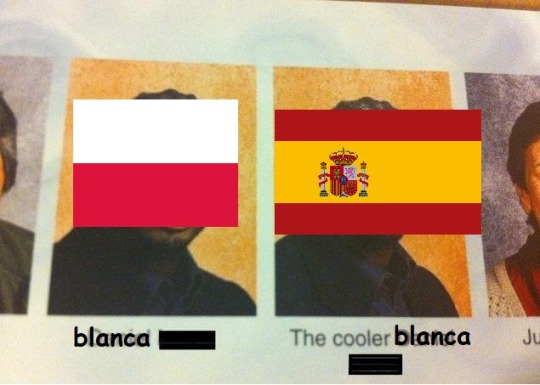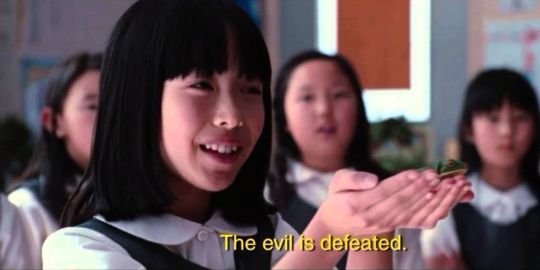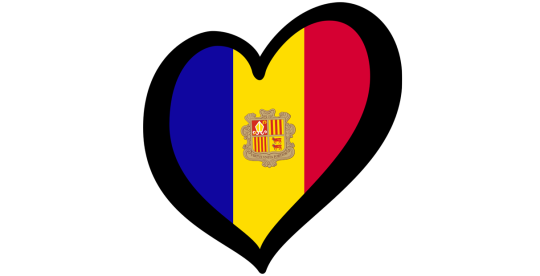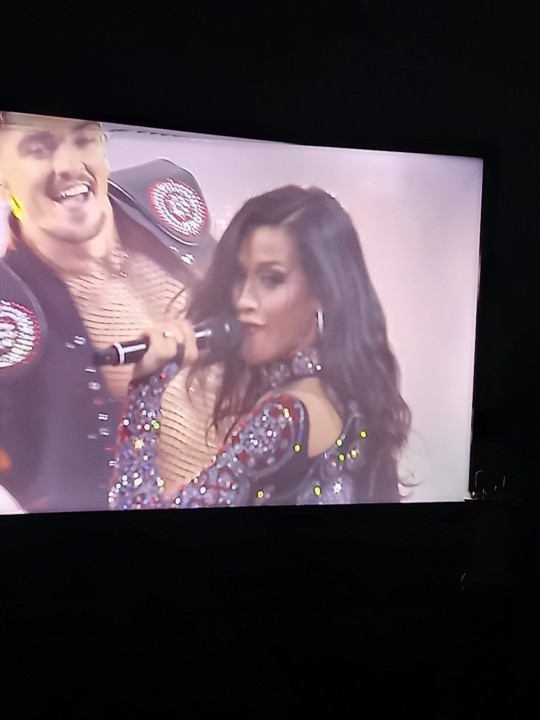#spain esc
Text

🇪🇸 Eva Santamaria - Hombres
#Eva Santamaria#Hombres#Spain esc#Spain eurovision#esc 1993#eurovision 1993#I have a soft spot for this song#also... Ukraine just chose their song for this year and I love it so much...
24 notes
·
View notes
Text
spains funky i like it
9 notes
·
View notes
Text
Spain is giving the hand tunnel from Labyrinth vibes
1 note
·
View note
Photo

is this a thing, are there any other blancas i missed
1K notes
·
View notes
Text
Europeans when Ukraine was announced as the winner and not the UK:

#eurovision 2022#eurovision#eurovision song contest#esc 2022#and not the uk or sweden or spain#but especially the uk#the songs and singers were cool! just... okay for eurovision tho??#YEAH I ADDED STG JUST FOR THE 10% OF PEOPLE WHO DIDN'T GET IT
6K notes
·
View notes
Text
Ah, it’s time for the annual european met gala where the budjet for everything is like 5€ and yet somehow the outfits still manage to look better and funnier than whatever the americans can come up with
#eurovision#esc#met gala#esc23#do the outfits look cheap? mostly yeah but so what?#are we having fun? heck yeah#remember georgia last year? spain?? albania??? yeah.
1K notes
·
View notes
Text

pasta gods reaching for me when i'm hungry
453 notes
·
View notes
Text

Thanks to Blanca Paloma yesterday, Spain now holds the record for the only country to land every single spot in the final!
263 notes
·
View notes
Text

🇪🇸 Azúcar Moreno - Bandido
#Azúcar Moreno#Bandido#spain esc#spain eurovision#esc 1990#eurovision 1990#esc#eurovision#one of my all-time favs <3#this one was a challenge but i think i did ok. sorry for another circle composition though :'D
53 notes
·
View notes
Text
Why does Andorra not participate in Eurovision anymore?

Andorra participated in the Eurovision Song Contest in 2004, 2005, 2006, 2007, 2008 and 2009, but it has never come back since.
-
What happened?
In 2004, ATV (Andorra’s public TV channel) sent Marta Roure, who sang in the Catalan language for the first time in Eurovision history. Catalan is the native language of Andorra, but also of the rest of the Catalan Countries: Catalonia, the Valencian Country and la Franja in the state of Spain; Northern Catalonia in the state of France, and the city of l’Alguer in Italy. ATV didn’t have enough money to send a participant alone, but Andorra wanted to take part in the contest and to promote their language (Catalan) and culture.
For these reasons, they decided to partner with TV3, the public TV channel of Catalonia. This makes sense, given that it’s part of the same nation, with the same language, and Catalonia has a bigger population and a music industry that’s a bit more developed, and TV3 has more money than ATV because of its population and size. The contest to choose who would be sent was made in collaboration between ATV and TV3 and aired simultaneously in both TV channels.
-
Spain’s threat to not air Andorra’s song
When TVE (the Spanish TV) saw that Andorra was working with Catalonia and one of Andorra’s purposes for participating in ESC was to promote Andorra’s language (Catalan), the director board of TVE threatened that they would not air Andorra’s performance because they considered it was a way for Catalan people to be present in Eurovision, which they didn’t think should be allowed. Basically, TVE would air the whole contest as usual, but cut to commercials when Andorra performed as if they did not exist.
After negotiations, the directors of TVE did not change their mind, but for unrelated reasons the director was changed in April 2004. The new directors didn’t care as much about Andorra’s participation and they decided to air the whole festival.
-
Andorra’s results and TVE’s meddling
Andorra’s songs never did well in the classifications, they never had enough votes to pass to the final. The change arrived in 2009, the song chosen was “Get a life / La teva decisió” by the Andorran-Danish singer Susanne Georgi. After its release before Eurovision, the song was a success in Andorra and in the state of Spain. The hopes were high for the song receiving many votes!
undefined
youtube
But, last minute, TVE (Spain’s TV) decided to not air live the Eurovision semi-final where Andorra was taking part. TVE decided to record the semi-final and air it on a different day. This means that Spanish citizens (including most Catalan people), who could have voted for Andorra, had no way to watch the semi-final and, as a result, they could not vote.
Once again, Andorra didn’t get to the final. And this was when they thought they had a chance with a successful song! After this, Andorra has never come back to the song contest. The fact that they never qualified for the final, Spain’s continuous meddling, and the high economic cost of participating in ESC (which is very difficult to afford for a microstate’s TV) grew even more difficult with the economical crisis that was starting in all the continent.
However, Andorra has always maintained that they would like to come back to ESC.
Andorra has been the only country to sing in the Catalan language in ESC. Even though most Catalan-speaking territories are under Spanish rule and about 10,000,000 Catalan speakers live in the state of Spain, Spain has never sent a song in Catalan. In fact, when they chose the Catalan singer Joan Manuel Serrat in 1968, he said he would sing the song (called “La, la, la”) in Catalan. Then, the Spanish TV decided to take him out of the contest because they would only allow songs in Spanish. The song was given to the Spanish singer Masiel, who sang the same song in Spanish and won the Eurovision Song Contest 1968. Spain has never sent a single song in one of the languages of the territories its state occupies, even when some like Catalan and Galician have millions of speakers, and Basque has hundreds of thousands.
#andorra#eurovision#esc#eurovision song contest#spain#esc spain#esc andorra#eurovision history#catalan#tve#atv#2009#2000s music#música#arts#susanne georgi#rtva#minority languages#europe#españa#microstates#Youtube
277 notes
·
View notes
Text
Spanish entry: is a lullaby
Blanca: screams
317 notes
·
View notes
Text
A Few Thoughts Regarding Why the ESC Jury is SO Dysfunctional
I’m going to cut right to the chase: The judgement criteria for the jury make literally no sense once you stop and think about them. They quite literally cause trolley problem after trolley problem. As a reminder, these are the criteria the jury was supposed to use to judge the performances this year:
composition and originality of the song,
quality of the performance on stage,
vocal capacity of the performer(s),
overall impression of the act.
Let’s start simple - vocal capacity of the performer(s):
As everyone’s aware, this year, we had many talented vocalists participating in the competition: A few examples are Sweden, Norway, France, Cyprus, Spain, Estonia, Albania and Portugal. They all came swinging with their vocalists. Notice something funny about this list of countries?
It’s based entirely upon the assumption that the ability to belt or the usage of one’s head voice is what defines someone’s vocal capacity. Here’s why this is a problem: Assuming that belting as an example is the peak performance of singing means to ignore other, arguably harder and more demanding techniques that are more unconventional sounding to the mainstream ear. A hilariously good example of this would be growling. It require a lot, and I mean a lot of technical prowess and control over your voice, and is thus arguably harder than say belting, as an example. Seriously. Try to growl. Right now. I bet most of you have noticed that you literally can’t growl without sounding hilariously pathetic. If you did manage to let out a decent growl, now try to sing while growling. Pick any song you like, and go for it. Pretty hard, right? And guess what! We had someone doing that this year, and being phenomenal at it.
Too bad they came last in the competition.
That’s right, if we’re going to start judging vocal abilities here, arguably the most vocally capable singer was Chris Harms. There are multiple parts in Blood and Glitter where he uses the growling technique. Not only that, but du-du-dum! He also belts during the song, and does so wonderfully. So, based on this, clearly, he was the most vocally talented artist out of the bunch, right? (Obviously, I am 100% simplifying things here, but bear with me for a bit.) He does everything that the previously mentioned group did, and more. Arguably we could also say that alongside him Alessandra is carrying the torch of the most vocally capable performer, as she does have that one whistle tone in her song (if you’re thinking what I think you’re thinking, don’t worry, we’ll get to that later).
However, this gets even more complicated than singing techniques, how hard they are to master, and how many of them you use in your song.
You see, we can’t really judge someone’s vocal capacity and compare them with the other contestants, when many of these artists were performing songs in different genres. Here are some of the genres represented during the Eurovision finale of 2023:
Metal
Industrial metal
Progressive metal
Rock
Alternative rock
Progressive rock
Pop rock
Pop
Dance-pop
House-pop
Latin-pop
Hyperpop
Chanson
Flamenco
Disco-house
Electronic
R&B
Rap
Schlager
Tractor (lol)
With this many genres, different singing techniques are more appropriate for some songs than others. So this is no longer even a question about comparing each contestant’s vocal abilities with one another (which is a problem, since you know, this is a competition), but rather who performs well within their own genre. Suddenly, we can add almost every contestant to the list of competent vocal performances. For those of you who are wondering, yes, even Käärijä came through with his vocal performance, especially in the first half of the song.
While we’re on the topic of Käärijä (and we won’t leave him for a bit), how are the juries supposed to judge the vocals of rap performances that are more heavily reliant on the enunciation of words than the vocals themselves, if the song’s not in English? Part of the reason Cha Cha Cha works so well is because of the way Käärijä raps certain lines or even words. How is any other jury, except the Finnish one, (who’re not allowed to vote for him,) supposed to catch something like how good the ”Ja mä jatkan kunnes en enää pysy tuolissa niinku” part sounds to a Finnish ear? Specifically the words kunnes, en and enää, are doing a lot of heavy lifting in that one singular line due to the rhythm and enunciation. Can a jury member who doesn’t understand Finnish catch onto the way he allows the first two words to almost melt into each other while pronouncing the last word ridiculously fast to create a very specific rhythm? I’m sure some jury members would notice that, but it’s just as likely to go completely unnoticed unless you’re familiar with the language.
Next, composition and originality of the song:
Again, we have a clear victor here: Cha Cha Cha is by far the most ”original” out of these songs (despite the Electric Cowboy plagiarism accusations, and it’s all thanks to the fact that the song does a genre based one-eighty by the end). I mean, hello? Blending industrial metal, rap, hyperpop and Finnish schlager? This is such a strange combination of genres, it becomes its own entity. And somehow it works. Personally, I’d say this is at least in part due to the melodic hook that repeats literally throughout the song. Those beeps and boops you hear after the first line of the song? They keep repeating themselves, in the chorus in the ”Cha, cha cha, cha cha cha cha” portion, and in the schlager part of the song, though there, the melody is cut in half and only the last three keys are present in the ”Niinku cha cha cha” parts and in the lines that end with an ”aa-aa-haa.” (So, ”Niinku cha cha cha, enkä pelkääkään tätä maailmaa-aa-haa” etc.) Obviously, we get to hear the melody in its entirety once again in the final cha chas. Brilliant! Douze point. Sometimes less is more, and I can’t believe I am saying that about fucking Cha Cha Cha but here we are. Simplicity is king.
Now, on the other hand, we could say that most of the pop entries are not original in the slightest. We could argue that there is literally nothing original about repeating the same pop formula and the same chord progressions which can be found in most pop songs. This is why Tattoo, Solo, Unicorn, I Wrote a Song, Break a Broken Heart, etc, are getting compared to other pop songs and accused of plagiarism: Pop music just is that generic in its building blocks. It’s also why we could argue that they’re not particularly noteworthy in their compositions.
And while we’re still on the topic of originality, songs that are tied to a specific genre are practically screwed. No one’s going to reinvent genres like cha-cha-chá, waltz or mambo here, unless they step away from what identifies these genres, the rhythm. If the rhythm isn’t there, it’s not a cha-cha-chá, waltz or mambo song. You wanna blend salsa and reggaeton? Too bad, salsaton is already a thing! Should everyone start doing what Käärijä and his team did, and mix a minimum of four genres with a somewhat unusual structure in order to be ”original”? What even is originality in the context of composition, really? There are only so many chords and chord progressions to use, there’s practically no way to actually be original, which is also why the topic of plagiarism is so fucking complicated when it comes to music in specific.
Anyway, let’s move on to the quality of the performance on stage:
To avoid making a lengthy repetition of the previous point, let’s keep this short: Depending on the genre of the song, a certain type of performance is going to be more appropriate than another. Imagine Alika having a performance like Let 3, or Teya and Salena performing like La Zarra. What’s that? It’s the taste of good ol’ thematic and tonal dissonance. Each song is elevated by a performance that matches that song in specific, and the artists can either perform well or fuck up. Again, this becomes a trolley problem, where the juries have to ask themselves: ”Do we value a performance like Joker Out’s above a performance like Luke Black’s?” When both perform well, it’s hard to compare them because they’re playing in two completely different ballparks.
Finally, the overall impression of the act:
Literally what the fuck does that even mean? This is actually just a preference question. Unless someone fucks up tremendously, everyone should be getting points for this. And that’s the core issue here. Because we’re dealing with such a large variety of different artists, different genres, different languages, it becomes impossible to judge them fairly against each other. Do we value belting above growling? Trolley problem. Do we value pop above metal or rock? Trolley problem. You get the point.
”Okay, but obviously the juries are basing their votes upon objectivity and looking at the whole package,” someone might say, and if they do, they’ve missed the point: There is no objectivity here, and because of that, there is no comparing whole packages either. Literally the only way to be objective about this is if everyone has an identical performance; same song, same staging, same camerawork, same choreography. And that’s not the point of the ESC. We’re supposed to be celebrating our individual cultures and our differences. Variety is quite literally required for this contest to work the way it’s intended to. At the end of the day, music is art, and art can be many things. You can’t argue that EAEA is more artistic than Mama ŚČ! (or vice versa) without opening a philosophical can of worms that is way too big for this silly competition. You can’t say Tattoo is objectively better than Cha Cha Cha (or vice versa), because, again, the songs shine in different criteria and are playing in two completely different ballparks. As a matter of fact, their ballparks exist on completely different planets. There are too many variables at play here for anyone to logically be able to be objective. And that’s when this becomes a question of voting based on opinion and personal taste (you know, if the concept of jury darlings hasn’t made this obvious enough). And personal taste is what the audience is supposed to base their votes upon.
Oh, and before I forget to touch upon that, Alessandra: According to some tabloids, her vocals were struggling during the jury show, and that’s why she in specific didn’t receive as many points from the jury as she probably should and could have otherwise. And that’s ridiculously unfair. Why should the jury and the audience base their judgements of an act on two completely different performances? As Käärijä has said in many interviews, each performance is unique and its own entity. Shit happens. Sometimes your vocals are struggling, other times a wire tries to murder you, etcetera. It’s actually bizarre that we don’t give our votes based on the same performance.
So yeah, shitty system, does not work, 0/10. Zéro point in French.
#anyway unnecessary rant over obviously everything I said was OBVIOUS but I felt like saying it anyway#esc#esc 2023#eurovision#sweden#loreen#norway#alessandra#france#la zarra#spain#blanca paloma#estonia#alika#albania#albina & familja kelmendi#portugal#mimicat#germany#lord of the lost#finland#käärijä#croatia#let 3#serbia#luke black#slovenia#joker out#austria#teya and salena
266 notes
·
View notes
Text
Made laugh so hard omg
276 notes
·
View notes
Text
Austria,Spain,Slovenia,Albania and Portugal being robbed at both jury and public votes

#eurovision 2023#esc 2023#esc#eurovision song contest#austria#spain#albania#portugal#Slovenia#personal opinion#we were fucking robbed
171 notes
·
View notes

